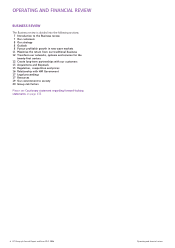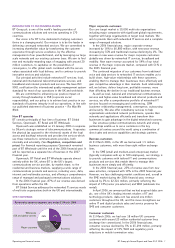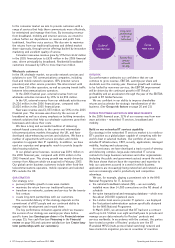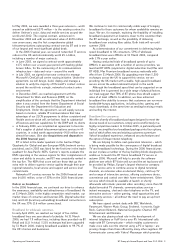BT 2006 Annual Report Download - page 18
Download and view the complete annual report
Please find page 18 of the 2006 BT annual report below. You can navigate through the pages in the report by either clicking on the pages listed below, or by using the keyword search tool below to find specific information within the annual report.Wholesale access charge reductions
As part of the strategic review and to encourage competition,
BT agreed that our wholesale access residential price would be
reduced in two stages. The first was a reduction of 50 pence a
month (£1.50 per quarter) implemented on 1 August 2005. The
second reduction followed the publication of Ofcom’s statement
on setting and reviewing charge ceilings for WLR (wholesale line
rental) on 24 January 2006. From 1 March 2006, our rates have
been as follows:
sresidential analogue lines: new line installation – £88,
transfer – £2 a line, and annual line rental – £100.68
sbusiness analogue lines: new line installation – £88,
transfer – £2 a line, and annual line rental – £110.
Partial private circuit charge control
PPCs (partial private circuits) are leased lines that BT sells to
other network operators. On 1 October 2004, Ofcom
introduced a PPC charge control to replace the annual
determinations previously carried out by Oftel.
The control is a four-year, three-part RPI-X formula:
slow bandwidth (RPI-4%)
shigh bandwidth (RPI-6.5%)
sequipment (RPI-8.9%).
Additionally, as part of our Undertakings, we have agreed to
make a new form of wholesale private circuit services available
via Openreach, subject to demand from other communications
providers. These are TILLAP (traditional interface leased lines
access product) and TILLBP (traditional interface leased lines
backhaul product).
Non-UK regulation
BT must comply with the regulatory regimes in the countries in
which we operate and this can have a material impact on our
business.
European Union
The degree to which European Commission directives relating
to electronic communications have been implemented varies
from country to country. Although the general move towards
the new regime continues, in some countries this is happening
more slowly than, for example, in the UK.
BT does not have universal service obligations outside the
UK, although in certain member states we may be required to
contribute towards an industry fund to pay for the cost of
meeting universal service obligations in those countries.
The European Commission is formally investigating the way
the UK Government has set BT’s property rates and those paid
by Kingston Communications. The Commission is examining
whether the Government has complied with European
Community Treaty rules on state aid in assessing BT’s rates.
BT’s rates were set by the Valuation Office after lengthy
discussions based on well established principles in a transparent
process. In our view, any allegation of state aid is groundless
and we are confident that the Government will demonstrate the
fairness of the UK ratings system. A finding against the UK
Government could result in BT having to repay any state aid we
may be determined to have received.
Rest of the world
The vast majority of the markets in which we operate around
the world are regulated, and in most of these we have to meet
certain conditions and obtain licences or other authorisations.
The degree to which these markets are liberalised varies widely.
Our ability to compete fully in some countries is therefore
constrained.
We continue to press incumbent operators and their national
regulatory authorities around the world (including the EU) for
cost-related access to their networks where appropriate.
Other significant changes and issues
Regulatory valuation of copper-based local access network
In August 2005, Ofcom reduced the current cost regulatory
asset value of the copper-based local access network. This
valuation is used only for regulatory purposes. Ofcom estimated
that the net current cost carrying value of these assets for
regulatory purposes at the end of the 2006 financial year will be
reduced by about £879 million. It also extended the periods
over which certain access network assets will be written off from
the 2007 financial year onwards.
Ofcom estimated that the combined effect of reducing net
current cost regulatory asset value and extending asset lives
would reduce costs (used for regulatory price setting) relating to
BT’s copper access lines by about £300 million in a full year,
excluding the impact of any change to the allowed return on
capital employed. These changes were reflected in revised
prices for wholesale line rental and unbundled local loops
announced in late 2005.
Cost of capital
In August 2005, Ofcom determined what it believed were
appropriate rates for BT’s cost of capital for regulated products
and services. This rate is used only as a reference against the
regulatory current cost values of BT’s regulated products. The
overall rate for BT’s cost of capital was assessed as 10.9% on a
pre-tax nominal basis, compared with a rate of 13.5% set in
2001. The reduction was a result of lower interest rates, a
change in Ofcom’s assessment of the premium associated with
investment in shares, and a revised view of BT’s overall risk
profile compared with the market as a whole.
This overall rate was split by Ofcom into a lower rate of 10%
for local access services (ie those now managed by Openreach),
and a higher rate of 11.4% for the rest of BT. The local access
rate was reflected in the revised wholesale prices proposed in
2005 by BT for both unbundled local loop and wholesale line
rental products.
IPStream and Datastream
In June 2005, we reached agreement with Ofcom that rental
prices for IPStream and Datastream – the most popular
wholesale ADSL broadband access products currently used by
service providers – will not reduce until there are 1.5 million
unbundled lines in the UK, with certain exceptions.
Funds for liabilities
Under the terms of the Electronic Communications Code, an
electronic communications provider with apparatus on or in the
public highway is required to make financial provision to cover
any damage caused by work it carries out, and for the removal
of its network in the event of liquidation or bankruptcy.
The conditions require the company to provide Ofcom
annually with a certificate that, in the opinion of its board of
directors, it has fulfilled its obligations to ensure the availability
of the required funds. This has been done by BT.
RELATIONSHIP WITH HM GOVERNMENT
The UK Government, collectively, is our largest customer, but
the provision of services to any one of its departments or
agencies does not comprise a material proportion of our
revenue. Except as described below, the commercial
BT Group plc Annual Report and Form 20-F 2006 Operating and financial review16
























